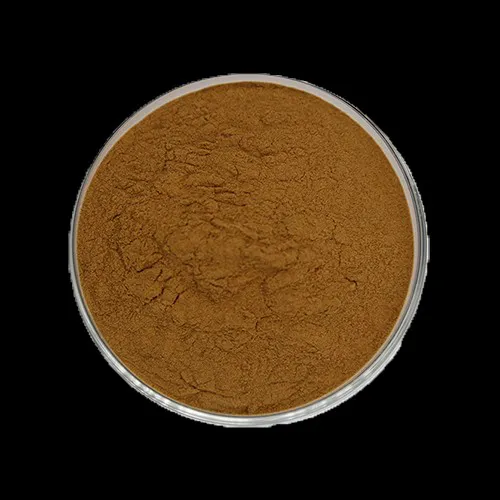- 0086-571-85302990
- sales@greenskybio.com
Withania somnifera extract: Is the extract effective for weight loss?
2024-11-13

1. Introduction
In the modern world, the pursuit of effective weight - loss methods has become a significant concern for many individuals. With the increasing popularity of natural remedies, ashwagandha extract has emerged as a potential candidate in the realm of weight management. Ashwagandha, scientifically known as Withania somnifera, is an ancient medicinal plant native to India and has been used in Ayurvedic medicine for centuries. This article delves into the scientific evidence to determine whether ashwagandha extract can truly contribute to weight loss.

2. Understanding Ashwagandha
2.1 Botanical and Chemical Properties
Ashwagandha is a small shrub with oval - shaped leaves and yellow flowers. The roots and leaves of the plant are the main parts used for extraction. The extract contains a variety of bioactive compounds, including withanolides, alkaloids, and steroidal lactones. These compounds are believed to be responsible for the plant's medicinal properties.2.2 Traditional Uses
In Ayurvedic medicine, ashwagandha has been used to treat a wide range of ailments, such as stress, anxiety, inflammation, and weakness. It was also considered a rejuvenating herb, enhancing overall vitality and well - being. However, its potential role in weight loss is a relatively new area of exploration.
3. Ashwagandha and Fat Metabolism
3.1 Influence on Lipid Synthesis
Some studies suggest that ashwagandha extract may have an impact on lipid synthesis in the body. It is proposed that certain components of the extract can interfere with the enzymes involved in the synthesis of fatty acids. For example, in vitro studies have shown that withanolides can inhibit the activity of key enzymes in the fatty acid biosynthesis pathway. However, it is important to note that in vitro results do not always translate directly to in vivo effects.3.2 Lipolysis Promotion
There is evidence indicating that ashwagandha extract may promote lipolysis, the breakdown of stored fat. Animal studies have demonstrated that treatment with ashwagandha extract led to an increase in the activity of lipolytic enzymes in adipose tissue. This suggests that the extract could potentially enhance the body's ability to mobilize and utilize stored fat for energy.
4. Ashwagandha and Energy Expenditure
4.1 Thyroid Function and Metabolism
The thyroid gland plays a crucial role in regulating metabolism. Ashwagandha extract has been shown to have an impact on thyroid function. Some research suggests that it can stimulate the production of thyroid hormones, which in turn can increase basal metabolic rate (BMR). An increased BMR means that the body burns more calories at rest. However, the effects on thyroid function may vary depending on individual factors such as pre - existing thyroid conditions.4.2 Muscle Mass and Energy Consumption
Another aspect related to energy expenditure is muscle mass. Ashwagandha extract has been reported to have anabolic effects, which could potentially help in increasing muscle mass. Muscle tissue is more metabolically active than fat tissue, so an increase in muscle mass can lead to an overall increase in energy expenditure. This could contribute to a positive energy balance and potentially aid in weight loss.
5. Ashwagandha and Hormonal Balance
5.1 Cortisol and Stress Management
Cortisol is a stress hormone that can have a significant impact on weight. High levels of cortisol are associated with increased abdominal fat deposition. Ashwagandha is well - known for its adaptogenic properties, which means it can help the body adapt to stress. By reducing stress levels, ashwagandha extract may help regulate cortisol secretion. Lower cortisol levels could potentially prevent the accumulation of abdominal fat and contribute to a more favorable body composition.5.2 Insulin Sensitivity
Insulin sensitivity is also crucial for weight management. Some studies suggest that ashwagandha extract may improve insulin sensitivity. This is important because improved insulin sensitivity allows the body to better regulate blood sugar levels and prevent excessive fat storage. When cells are more insulin - sensitive, they are more likely to take up glucose from the bloodstream, reducing the need for the body to convert excess glucose into fat.6. Clinical Studies on Ashwagandha and Weight Loss
6.1 Human Trials
There have been some human trials investigating the effects of ashwagandha extract on weight loss. In a recent study, participants who took ashwagandha extract for a certain period showed a modest reduction in body weight compared to the control group. However, it is important to consider the limitations of these trials. The sample sizes were often relatively small, and the study durations were sometimes short. Additionally, other factors such as diet and exercise were not always strictly controlled.6.2 Meta - Analyses
Meta - analyses that combine the results of multiple studies can provide a more comprehensive view. Some meta - analyses on ashwagandha and weight - related parameters have been conducted. While these analyses have shown some promising trends, the overall evidence is still not conclusive. There is a need for more large - scale, well - designed clinical trials to further evaluate the effectiveness of ashwagandha extract for weight loss.7. Safety and Side Effects
7.1 General Safety Profile
Ashwagandha extract is generally considered safe when taken in appropriate doses. However, like any supplement, it may cause side effects in some individuals.7.2 Potential Side Effects
Some possible side effects include gastrointestinal discomfort, such as nausea, diarrhea, and stomach cramps. In rare cases, it may also cause allergic reactions. It is important to note that pregnant and breastfeeding women should exercise caution when considering ashwagandha supplementation, as there is limited research on its safety in these populations.8. Conclusion
In conclusion, the evidence regarding the effectiveness of ashwagandha extract for weight loss is somewhat mixed. While there are scientific studies suggesting that it may have positive effects on fat metabolism, energy expenditure, and hormonal balance, the current clinical evidence is not yet strong enough to firmly establish it as a reliable weight - loss solution. The potential benefits shown in some studies are promising, but more research, especially large - scale, long - term human trials, is needed. Additionally, it is important to remember that any weight - loss strategy should be part of a comprehensive approach that includes a healthy diet and regular exercise. Ashwagandha extract may potentially be a useful adjunct in the pursuit of weight loss, but it should not be considered a magic bullet on its own.
FAQ:
What is Ashwagandha extract?
Ashwagandha extract is derived from the Withania somnifera plant. It has been used in traditional medicine for various purposes. It contains a variety of bioactive compounds such as alkaloids, withanolides, and sitoindosides.
How might Ashwagandha extract affect fat metabolism?
Some studies suggest that Ashwagandha extract may influence fat metabolism. It could potentially increase the activity of certain enzymes involved in breaking down fats. However, more research is needed to fully understand the mechanisms and the extent of its impact on fat metabolism.
Does Ashwagandha extract increase energy expenditure?
There is some evidence indicating that Ashwagandha extract might play a role in increasing energy expenditure. It could potentially boost the body's basal metabolic rate, which means the body burns more calories at rest. But again, the evidence is not conclusive, and further studies are required.
Can Ashwagandha extract help balance hormones related to weight?
Ashwagandha extract is thought to have an impact on hormonal balance. For example, it may help regulate cortisol levels. Since high cortisol levels can be associated with increased abdominal fat storage, by regulating cortisol, it might indirectly contribute to weight management. However, the relationship between Ashwagandha extract, hormonal balance, and weight loss is complex and still being explored.
Are there any side effects of using Ashwagandha extract for weight loss?
While Ashwagandha extract is generally considered safe for most people when used appropriately, some individuals may experience side effects. These can include stomach upset, diarrhea, or in rare cases, allergic reactions. Pregnant or breastfeeding women should be cautious as its safety in these situations has not been fully established.
Related literature
- The Effects of Ashwagandha (Withania somnifera) on Fat Metabolism: A Review of the Current Evidence"
- "Ashwagandha Extract and Energy Expenditure: An In - Depth Analysis"
- "Hormonal Regulation by Ashwagandha: Implications for Weight Management"
- ▶ Hesperidin
- ▶ citrus bioflavonoids
- ▶ plant extract
- ▶ lycopene
- ▶ Diosmin
- ▶ Grape seed extract
- ▶ Sea buckthorn Juice Powder
- ▶ Beetroot powder
- ▶ Hops Extract
- ▶ Artichoke Extract
- ▶ Reishi mushroom extract
- ▶ Astaxanthin
- ▶ Green Tea Extract
- ▶ Curcumin Extract
- ▶ Horse Chestnut Extract
- ▶ Other Problems
- ▶ Boswellia Serrata Extract
- ▶ Resveratrol Extract
- ▶ Marigold Extract
- ▶ Grape Leaf Extract
- ▶ blog3
- ▶ blog4
- ▶ blog5
-
Organic Tongkat Ali extract powder factory.
2024-11-13
-
How to make powder with ashwagandha extract.
2024-11-13
-
Rosehip extract manufacturers from China.
2024-11-13
-
The best cat's claw extract in nature.
2024-11-13
-
Chinese Dandelion Leaf Extract Suppliers.
2024-11-13
-
Shikonin
2024-11-13
-
Peppermint Oil
2024-11-13
-
Andrographis Paniculata Extract Powder
2024-11-13
-
Curcumin Extract
2024-11-13
-
Bamboo Leaf extract
2024-11-13
-
Nettle leaf extract
2024-11-13
-
Lycopene
2024-11-13
-
Baicalin
2024-11-13
-
Tamarind extract powder
2024-11-13
-
Hedyotis Diffusa Extract
2024-11-13





















